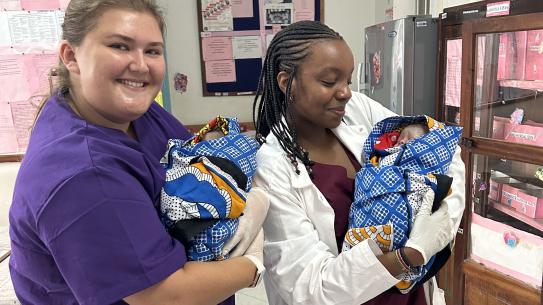UN Sustainability Goals
- Quality Education
- Clean Water and Sanitation
- Reduced Inequalities
Areas of Excellence
- Health
- Sustainability
Global Challenge: UN SD6 and 8: Clean Water and Sanitation and Reducing Inequality
Abstract
Access to clean drinking water remains a critical challenge globally, particularly in regions like sub-Saharan Africa, where 58% of people drinking from unprotected sources face heightened risks of waterborne diseases. Growing up in Kenya and South Africa, I witnessed first-hand the disparities in water accessibility and the profound impact of water scarcity on communities. Motivated by these experiences, I embarked on research within the Global Leaders and Scholars in STEM (GLASS) Honours Program to address United Nations Sustainability Goal 6: Clean Water and Sanitation. This research delves into understanding the resistance mechanisms of bacteria sourced from wastewater against disinfectants, particularly focusing on the commonly used monochloramine. Previous studies have highlighted disparities in disinfection kinetics between laboratory-cultured bacteria and those indigenous to wastewater environments. Our hypothesis suggests that physiological factors induce resistance in environmental bacteria, necessitating a closer examination of their disinfection behaviour to protect human health from waterborne diseases. To test this hypothesis, we conducted experiments with isolate colonies of Enterococci and Escherichia coli obtained from wastewater, mirroring laboratory culture procedures. These bacteria, recognized as biological indicators for faecal contamination, were subjected to monochloramine exposure. Preliminary data suggests that wastewater-sourced bacteria grown in the lab exhibit lower resistance to disinfection compared to their natural counterparts, shedding light on potential resistance mechanisms which were mainly physiological. By identifying the mechanisms’ underlying disinfection resistance in wastewater-sourced bacteria, this study contributes to enhancing water purification processes, ultimately advancing efforts towards achieving universal access to clean and safe drinking water.
Bio:
Joy Sure was born and raised in Kenya before relocating to South Africa at the age of five. Her journey into the realm of STEM has been deeply influenced by her early experiences and a relentless curiosity about the world around me. From a young age, she was captivated by the world of numbers and the transformative power of scientific innovation. Witnessing the profound impact of scientists and engineers on society ignited a passion within her for problem-solving and exploration, leading her on a path towards pursuing a degree in Chemical and Biomolecular Engineering, accompanied by minors in Finance and Mathematics.
Her academic journey has always been intertwined with a commitment to addressing pressing societal challenges which were catalysed by her experience in the Global Leaders and Scholars in STEM Honours Program. Over the years, her experiences have addressed the United Nations' sixth and tenth Sustainable Development Goals of Clean Water and Sanitation, and Reduced Inequalities. Her awareness of the disparities in mortalities due to waterborne diseases between developed and developing nations and events such as Day Zero which affected water accessibility in South Africa motivated her to dedicate her GLASS experience to efforts that made potable water more accessible.
As a research assistant in the Silverman Laboratory, she had the privilege of delving into a current, pressing problem in wastewater purification – wastewater bacterial resistance. Our research investigated mechanisms of resistance present in wastewater bacteria that may resulted slower disinfectant decay as compared to various isolate colonies of Enterococci and Escherichia coli. After obtaining the results of this study, the specific Enterococcus spp. was identified and quantified to determine which strain was still prevalent after wastewater treatment. These studies were crucial in enhancing our understanding of the efficacy of common disinfectants in wastewater treatment and current research monitoring bacterial decay which is important for protecting public health.
Her journey within the Global Leaders and Scholars in STEM program has been one of growth, discovery, and unwavering commitment to effecting positive change. Through its five components of professional development, academic excellence, commitment to service, global competence, and leadership development, GLASS has provided her with the platform and resources to realize her potential as a STEM leader and make a meaningful impact at NYU and globally. As she plans her next steps post-graduation, she hopes to leave you with one of her favourite quotes which has inspired her life-journey:
"For what it’s worth, it’s never too late, or too early to be whatever you to be. There’s no time limit. Start whenever you want. You can change or stay the same. There are no rules to this thing, we can make the best or the worst of it. I hope you see things that startle you. I hope you feel things that you have never felt before. I hope you meet people with a different point of view. I hope you live a life you’re proud of, and if you're not, I hope you have the courage to start over again."
~ F. Scott Fitzgerald


